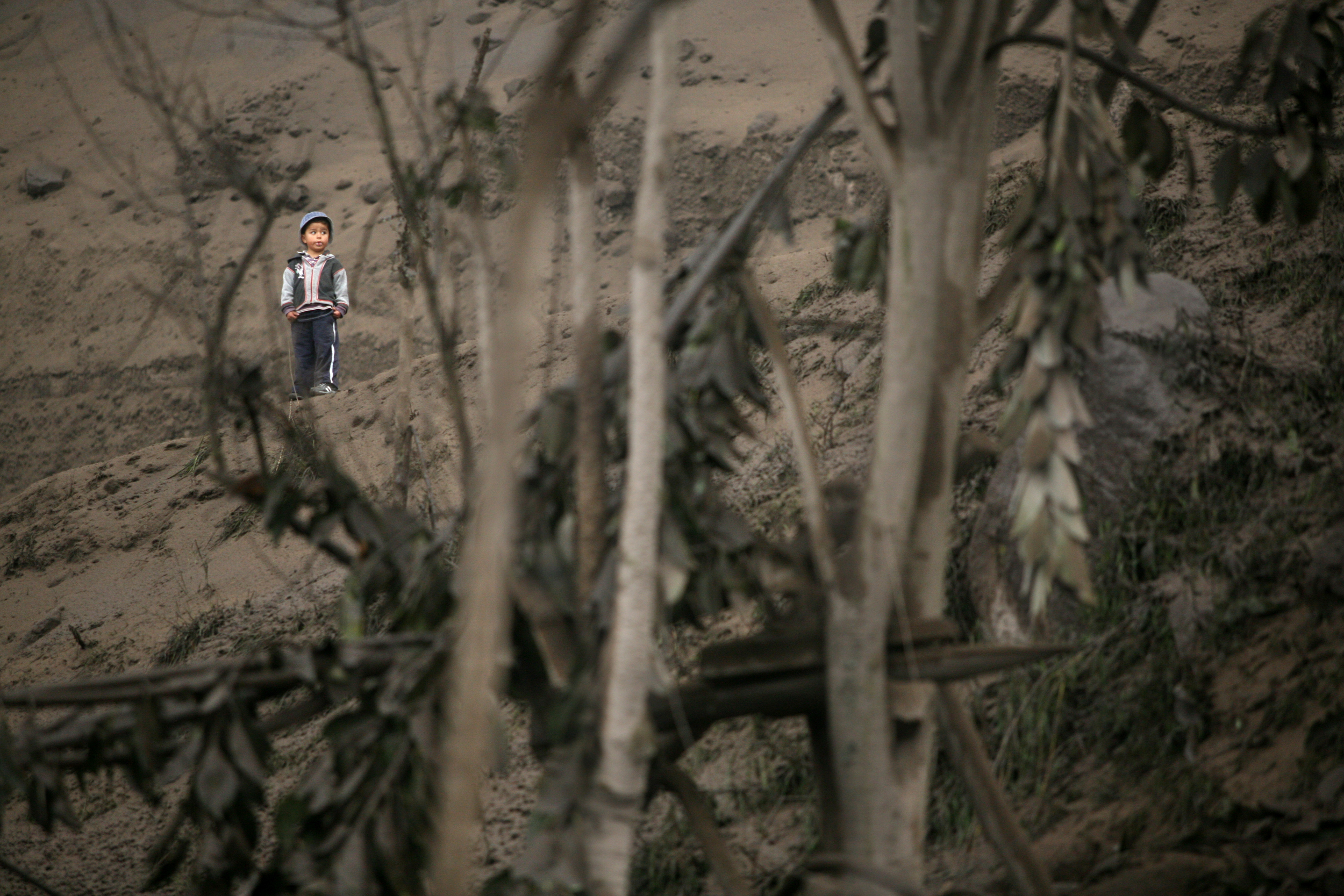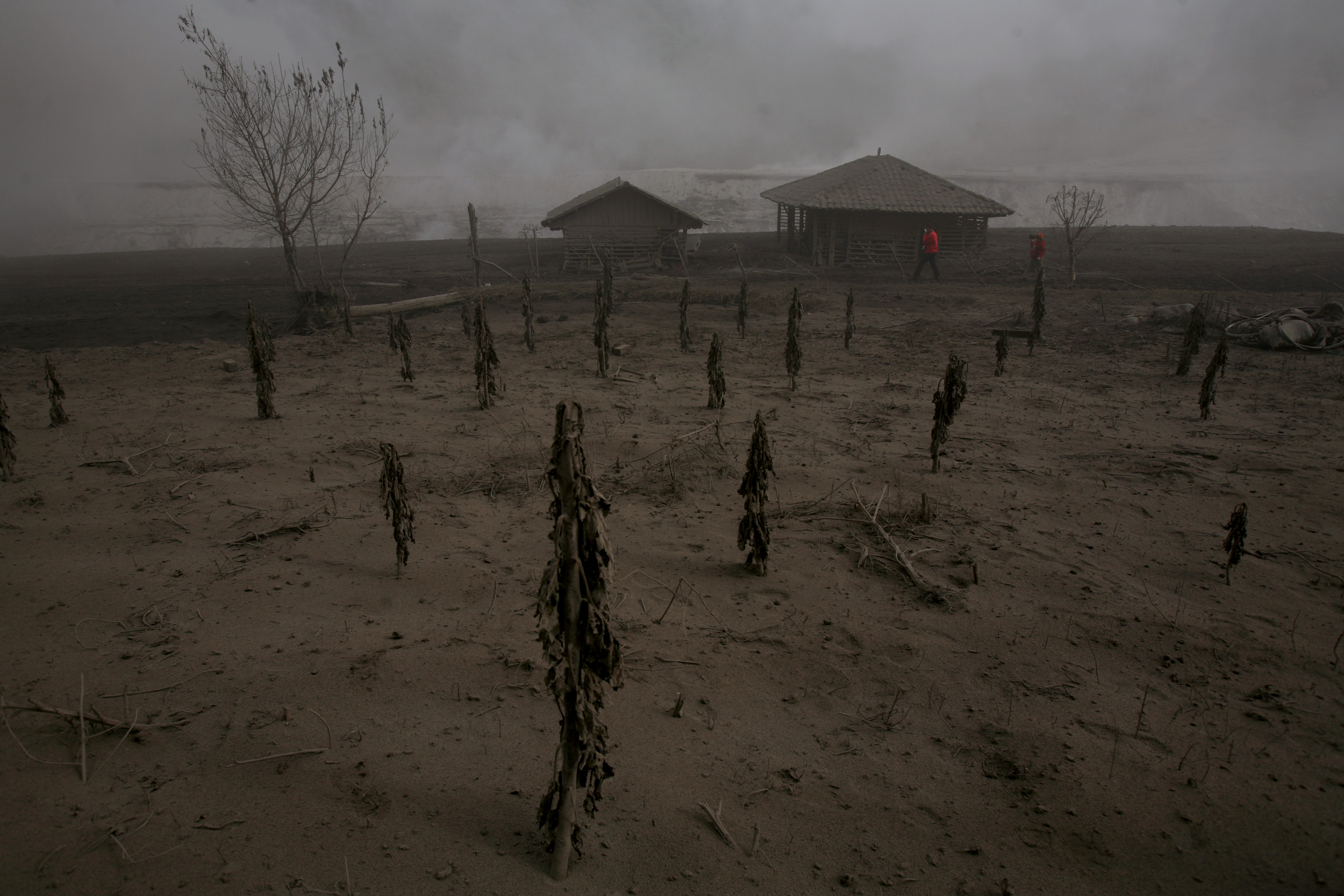Tungurahua [by Ivan Kashinsky]
Palictahua, 12:33 a.m.
“We could have never imagined anything like it,” Olger Guamán said to me when we were in the refuge. He described how rocks fell like rain as the roofs of their houses collapsed. The noise was so intense that he did not realize what was coming down the canyon. When he looked up at Tungurahua, he saw a river of lava headed towards him. He grabbed his two kids, held a piece of tin over his head, and ran for his life. The lava was only twenty meters behind him and he could feel the heat on his back.
“It was red! When I turned around, I saw it. It was red! I thought that it was the end.”
Everyone ran for higher ground while the burning rocks hit the cables, leaving Palictahua in a terrible darkness. The people ran into each other, falling, crying and screaming. No one could see the road. The small pueblo turned into a chaotic hell.
It’s hard to imagine what it was like to be in Palictahua that Thursday morning. It’s even harder to imagine how it was for the people who left too late. “It was like a horror movie,” explained Juan Salazar, the mayor of Penipe. “In a few seconds the people had to decide if they were to become heroes, or run and save their own lives.”
Luz, Frank, and Carmelina
When we were sitting, surrounded by the cold blue and white walls of the hospital, Luz Villavicencio told me what happened the night before. Her son, Frank Baus, was lying in a room next door. His entire body was severely burned and he was connected to various medical devices. The night of the disaster, Luz was with Frank and her parents, Carmelina and Luis Villavicencio.
“When the rocks began to fall from the sky, I said, ‘for God’s sake let’s get out of here’”, she began.
She told me that her son, Frank, left before her. He was helping his grandma, Carmelina, who could hardly walk because of her arthritis. Luz was still in the house tying the shoes of her father when a volcanic cloud of gas surrounded them. They fell to the floor and her father began screaming. She told her father not scream and to try not to breathe in the toxic fumes. Frank was below when the cloud covered the pueblo. He was trying to bring his grandma to higher ground where his neighbors were waiting.
“Frank! Leave her! Leave your grandma! You can still save yourself! Leave!” the neighbors began to scream as the immense toxic cloud began to close in on them.
“No. If we die, we die together!” he screamed back.
Frank threw himself over his grandma trying to protect her from the toxic heat. The gas burned eighty percent of his body. When Luz arrived, her mother was laid out on the ground. She insisted that they had to bring her to higher ground. Frank told her that he couldn’t help because he was badly burned.
“But Papi, you’re the only one here!” she yelled. Frank agreed and he screamed in pain while he helped to bring Carmelina to a safe place. Luz continued to tell me: “It was so dark. I grabbed his hand, and said, ‘what is this?’ the skin on his hand was hanging down like a loose glove.”
Frank’s grandma died three days later. She had breathed in the toxic gas and her respiratory system had deteriorated. Because of her age, she was too weak to hold on. Carmelina had raised Frank from the time he was four months old. He still did not know she was dead. His family thought that it might affect his recovery.
Luz, with a sad smile, continued, “He loved her so much. He would always make hearts in his notebook in school and put Carmelina in the center… They loved each other so much.”
Frank was sent to Boston for reconstructive surgery. Months later he came back to Ecuador a hero.
Luis and Pancracio
While I walked through the destroyed pueblo of Palictahua, a giant mushroom cloud of smoke rose from Mama Tungurahua. Grey, everything was grey. It looked as though an atomic bomb had landed on the town. Legs of dolls, shoes, underpants, and all kinds of objects, were abandoned in the dusty floor of the lunar landscape.
In the middle of this apocalyptic scene, stood a lonely oven for making bread. It was the only thing left of Luz’s house. An old man with a large cane and a ragged hat walked up to the oven and looked inside. As I moved in closer, I realized it was Luis Villavicencio, Luz’s dad. He had just lost his wife, his house, and all his belongings. A small dog poked its head out of the oven. His legs and face were burned from the disaster. Luis reached out his hand to one of the only things that was left, Pancracio. He had been coming regularly to give bread to the dog, in hopes of keeping him alive. Luis raised his head and looked at me. “It looks like we saved him”, he said. “I think he’s going to survive because he’s eating.”














